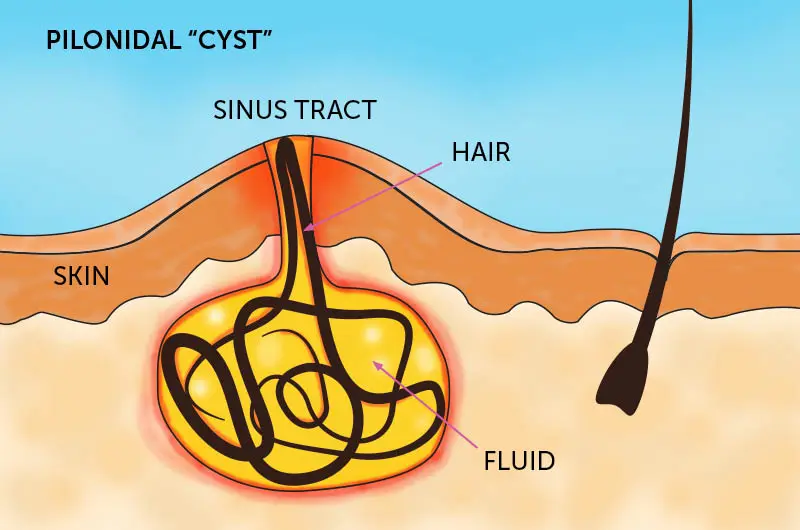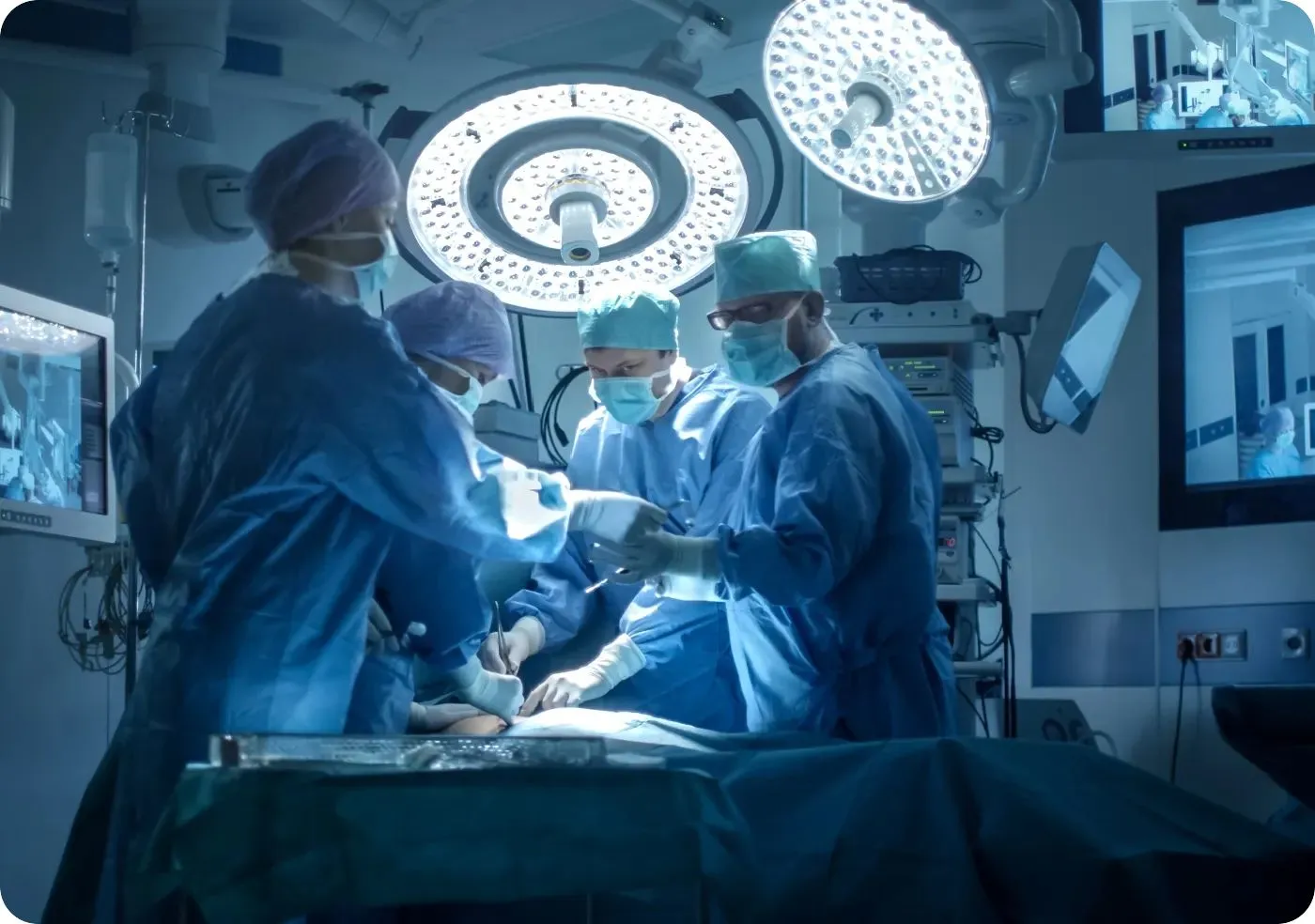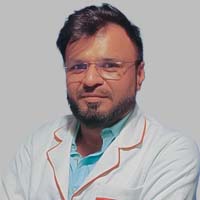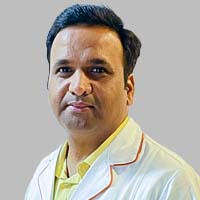Get Minimally Invasive Laser Treatment for Pilonidal Sinus in Baramati
Pilonidal sinus is a fairly common inflammatory condition that can occur anywhere along the crease between the buttocks, which runs from the bone at the bottom of the spine to the anus itself. A pilonidal sinus itself is actually a small hole or channel that has formed under the skin and is completely benign (non-cancerous). It is not considered to be indicative of any kind of cancer, either. In fact, if it does not cause you any bothersome symptoms, you can leave it unattended. However, an untreated case of pilonidal sinus stands the risk of becoming infected and could lead to complications. Pilonidal sinus mostly affects and is also commonly found in young adults. It is also common in people who sit a lot, have a sedentary lifestyle, or drive cabs. Some of the most common pilonidal sinus symptoms include:
- Pain while sitting or standing
- Red or sore skin around the cleft
- Drainage or blood or pus from the abscess
- Protrusion of hair from the lesion
- Formation of sinus tracts, or holes in the skin
- Swelling around the cleft
If you are suffering from any of the above-mentioned symptoms, it is advised to consult with your healthcare provider as soon as possible. Contact us today and book your consultation with the best pilonidal sinus doctors in Baramati. Undergo safe and effective laser pilonidal sinus surgery in Baramati.

Preoperative Tests and Diagnostics
Prior to your laser pilonidal cyst surgery, your proctologist will likely perform a series of simple tests and diagnostics to assess and evaluate your overall health. In most cases, preoperative diagnostics for pilonidal sinus concludes with a physical and visual examination of your cleft region. During this test, the doctor will examine the cleft area to deduce the severity of your condition and check for signs of infection. These could include redness, swelling, discharge of a yellowish substance, or tenderness. Alongside, your doctor may also ask you some questions regarding your overall health, surgical history, medical history, hygiene habits, and lifestyle habits. If you suffer from any conditions or take any medications, it is important that you inform your doctor about them as well.
In most cases, these tests are enough to diagnose pilonidal sinus and determine its severity. However, to better understand your overall health and minimize the chances of any complications as much as possible, they may perform some additional tests as well, such as:
- Ultrasound: Ultrasound is a commonly performed diagnostic test that your proctologist may perform to image the insides of your body. This test will help your doctor examine the soft tissue of the natal cleft and visualize the sinus’s track on any plane above the coccyx or the triangular, final segment of your vertebral column.
- MRI: Magnetic Resonance Imaging, MRI is a medical examination that uses magnetic and radio waves to create a detailed image of the internal structure of your body. This test will allow your proctologist to assess the extent of sepsis associated with pilonidal sinus.
- Tissue Biopsy: In a tissue biopsy test, the doctor will remove a small piece of tissue or sample of cells from your body and analyze it in a laboratory.
How is Pilonidal Sinus Surgery Performed?
There are primarily 3 surgical procedures that are usually performed as effective pilonidal sinus treatment. While all methods are considered to be safe and effective, they vary in their overall procedure and equipment. The main goal for these procedures, however, remains the same i.e, removing the affected tissue and preventing it from recurring. A rough overview of what you can expect during your pilonidal cyst surgery is given below:
- Incision and Drainage: Incision and drainage is a commonly performed surgical procedure that involves cutting and draining the fluids accumulated in the pilonidal cyst. The entire procedure is typically performed under local anesthesia and does not take more than 10-20 minutes to complete. It is an outpatient procedure, meaning you will be able to go home on the same day of the surgery. In this procedure, the surgeon makes a small incision in the cyst itself to drain the fluid and pus inside it. The incision is then packed with a gauge and left open to heal. Generally, it takes anywhere from 4-5 weeks for the cyst to heal. It is also to be noted that the gauge is changed often during the recovery.
- Open Pilonidal Cystectomy: An open pilonidal cystectomy is a surgical procedure that involves the complete removal of the pilonidal cyst and its surrounding tissue. In this procedure, the surgeon makes incisions to remove to drain the abscesses and remove the cyst completely along with underlying tissue and hair follicles. As a result, the chances of recurrence after a pilonidal cystectomy surgery are almost zero. Depending on how much tissue is removed, the surgical wound may or may not be packed with gauze. If the infection is severe, your doctor may place a tube to drain the fluid from the cyst. Once the fluid has been completely drained, the tube will be removed. Similar to drainage and incision, pilonidal cystectomy is performed on an outpatient basis and does not take more than 30-40 minutes to complete. Once the procedure is complete, you will likely be able to go home on the same day of the surgery.
- Laser Pilonidal Sinus Surgery: Laser pilonidal sinus surgery is a medically advanced and minimally invasive procedure that utilizes a medical-grade laser to destroy the sinus tracts. In this procedure, incision size is extremely high, and as a result, recovery time is considerably short compared to conventional methods of pilonidal sinus treatment. Additionally, the chances of any complications, such as excessive bleeding or infection, are almost negligible. Pilonidal sinus laser surgery is usually performed under local anesthesia and does not take more than 20-30 minutes to complete. It is also an outpatient surgery, and you will likely be able to go home on the same day of the surgery.

Best Doctors For Pilonidal Sinus Treatment in Baramati
Our experts are here for you every single day! We care about our patients and we do our best to make them happy.
Our Patients Review
Best Clinics For Pilonidal Sinus Treatment in Baramati
Frequently Asked Questions About Pilonidal Sinus
Can pilonidal sinus go away without surgery?
In some cases, a pilonidal sinus can go away on its own. However, your condition may reoccur after a period of time. It is also to be kept in mind that even after the pus has drained from the cyst, the sinus tract itself remains in your body and can become infected again. If you are experiencing pilonidal symptoms, it is best to seek medical advice from the best doctors for pilonidal sinus in Baramati.
What happens if the pilonidal sinus is not treated?
If the pilonidal sinus is left untreated for a long time, it could lead to serious complications. These usually include:
- Infection
- Abscess
- Formation of fistula tract
- Chronic pain
Should you pop a pilonidal cyst?
It is typically best to leave a pilonidal cyst untouched and avoid popping it yourself. Popping a pilonidal cyst can increase your risk of infection and could also leave a scar. It is advised to contact your healthcare provider and seek medical advice.
What is the average cost of pilonidal sinus laser surgery in Baramati?
On average, pilonidal sinus laser treatment cost in Baramati can range anywhere from Rs. 40000 to Rs. 50000. However, depending on a multitude of factors, the actual surgery cost will likely differ. These typically include:
- Consultation charges
- Method of Surgery
- Expertise of your surgeon
- Cost of preoperative tests and diagnostics
- Postoperative follow-up consultations
How long does laser pilonidal sinus surgery take?
In most cases, it takes around 15 to 20 minutes for a laser pilonidal sinus surgery to complete. However, the exact duration of your procedure may differ depending on a multitude of factors.
Which doctor is best for a pilonidal cyst?
A proctologist is generally considered to be the best surgeon for pilonidal sinus treatment. If you are suffering from pilonidal cyst symptoms, get in touch with us today and book your consultation with the best pilonidal cyst doctor in Baramati.







Pristyncare_Clinic.webp)
Pristyncare_Clinic.webp)
Pristyncare_Clinic.webp)
Pristyncare_Clinic.webp)
Pristyncare_Clinic.webp)
Pristyncare_Clinic.webp)
Pristyncare_Clinic.webp)
Pristyncare_Clinic.webp)
